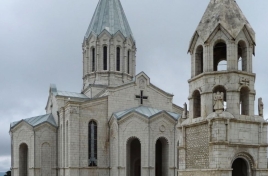International organizations alarmed by the fate of Artsakh's cultural heritage
Thursday, October 24, 2024
The "Geghard" Scientific Analytical Foundation has addressed concerns in an article regarding the fate of Artsakh's cultural heritage, emphasizing the need for concrete and targeted actions by international organizations to prevent Azerbaijan's policy of cultural destruction.
The article reads as follows:
Following the 44-day Artsakh War in 2020 and the complete seizure of Artsakh and the forcible displacement of Armenians in 2023, Azerbaijan has continued to target and destroy Armenian cultural heritage at the state level in Artsakh. Particularly at risk are memorials dedicated to the victims of the Artsakh liberation war (Shushi, Stepanakert, Askeran, Martuni, Martuni, etc.), statues and busts of heroes (Alex Manukyan, Charles Aznavour, Hovhannes Baghramyan, Anatoly Zinevich, Vazgen Sargsyan, Tatul Krpeyan, Hovhannes Isakov, etc.), memorials to the victims of the genocide, historical Armenian cemeteries (the historical cemetery of Shushi, Mets Tagher, Ghazanchetsots, Sghnakh, etc.), churches and monastic complexes (St. Hambardzman of Berdzor, Kanach Zham of Shushi, St. Astvatsatsin of Mehakavan, etc.), and cultural monuments created during the period of independence. In parallel with physical destruction, Azerbaijan continues to albanize and present as Orthodox (Gtchavank, Amaras, Gandzasar, Dadivank, etc.) cultural monuments, depriving them of their Armenian identity.
International responses to the 44-Day Artsakh war and the subsequent forcible displacement of Armenians
The ongoing cultural genocide in Artsakh has garnered some attention from international cultural heritage organizations. During and after the 44-day war, the Ministries of Foreign Affairs and Education, Science, Culture, and Sport of Armenia and Artsakh repeatedly appealed to international organizations such as UNESCO, the International Council of Museums (ICOM), the World Monuments Fund (WMF), the International Council on Monuments and Sites (ICOMOS), the Blue Shield International (BSI), the International Centre for the Study of the Preservation and Restoration of Cultural Property (ICCROM), the European Association of Archaeologists (EAA), and the Alliance for the Protection of Heritage in Conflict Areas (ALIPH) to intervene and prevent the destruction, desecration, and falsification of Armenian cultural heritage in Artsakh.
During the war renowned international experts, scholars, and researchers urged to protect the cultural heritage. On October 16, 2020, a group of renowned scholars, including N. Chomsky, G. Spivak, T. Ali, V. Berberian, J. Herman, C. West, S. Benhabib published an open letter calling for an end to the cultural and human massacre. They highlighted the endangerment of Artsakh's cultural heritage and emphasized the urgent need for the international community to safeguard it.
Nevertheless, while valuing the opinion and stance of the academic community, it is important to emphasize that international organizations possess more serious mechanisms and leverage over Azerbaijan's propaganda. For instance, on November 20, 2020, UNESCO Director-General Audrey Azoulay issued a statement expressing readiness to provide technical assistance and send a mission to Artsakh to assess and take necessary steps for the preservation of historical, cultural, and religious heritage. However, to date, Azerbaijan has not given its consent. In 2023, Audrey Azoulay reaffirmed UNESCO’s request to enter Artsakh and conduct monitoring regarding the state of cultural heritage. Azerbaijan rejected the request, categorically forbidding international organizations from "interfering in its internal affairs".
The International Council on Monuments and Sites (ICOMOS) has issued several statements condemning the destruction of Armenian heritage in Artsakh, particularly medieval Armenian churches, monasteries, and khachkars. Such actions constitute violations of international cultural heritage conventions, including the 1954 Hague Convention for the Protection of Cultural Property in the Event of Armed Conflict.
The joint statement by ICOMOS, ICOM, and ICA regarding the cessation of cultural genocide in Artsakh has also remained unanswered. The European Association of Archaeologists (EAA) has joined the calls for the preservation of Artsakh's cultural heritage. The EAA emphasized that the destruction of archaeological sites and cultural monuments is a serious violation of international law and highlighted the importance of impartial assessments by independent experts.
Genocide scholars and human rights organizations, including "Genocide Watch," have condemned Azerbaijan's actions, stating that the destruction of Armenian cultural heritage in Artsakh is part of a pattern aimed at erasing the historical Armenian presence from the region. According to them, the deliberate targeting of churches and other symbols of Armenian identity constitutes cultural genocide, as it seeks to destroy the cultural heritage of a group, serving as a precursor to physical genocide.
The International Association of Genocide Scholars (IAGS) has raised alarms about the cultural destruction in Artsakh. It has drawn parallels with other cases of cultural genocide, such as the destruction of cultural sites in the former Yugoslavia and the actions carried out during ISIS occupation in Syria.
Human Rights Watch (HRW) has reported on the destruction of cultural sites as a result of the Nagorno-Karabakh conflict, calling to hold accountable Azerbaijani authorities for the state-level policy of destruction and vandalism of cultural heritage. The report emphasizes that international law, including the Geneva Conventions, prohibits the deliberate destruction of cultural heritage during armed conflicts. HRW has urged international organizations to prevent further damage and to hold those responsible accountable.
Thus, it is evident that international organizations, through appeals and resolutions, are attempting to curb Azerbaijan's ambitions to destroy and appropriate Armenian heritage. However, the fact remains that these calls are not enough. Targeted and concrete actions from international organizations are necessary to prevent Azerbaijan’s policy of culturicide."
Published by Armenpress, original at https://armenpress.am/en/article/1203160





